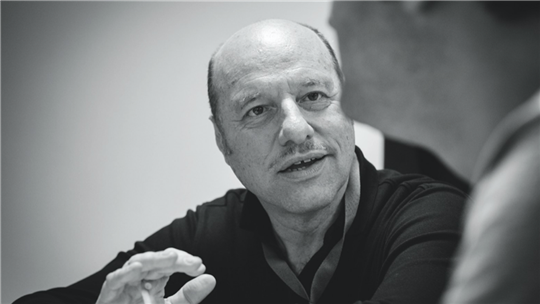
"Education, the responsibility of the gaze”
Writer and teacher Eraldo Affinati founded "Penny Wirton" in Rome, a free Italian school for immigrants. Ahead of the meeting with Carrón on January 30, he discusses his experience of lockdown and the letter written by teachers from CL.We must continue to have confidence in our students and our teachers. I think that this is the essential indication that emerges from the letter written by a group of teachers and educators from CL published in Corriere della Sera on January 10. How can we not agree? All too often the subject of distance learning is discussed in a conflictive way, when it should be clear that we are talking about the common good par excellence, national education, which should be free from instrumentalization.
Notwithstanding the irreplaceability of person-to-person teaching, which we all want to return to, it would be futile to continue to insist upon dissatisfaction with online teaching. This is a choice aimed at the lesser evil, within a delicate and complex social system that involves classrooms, transportation, infection indexes, family organization. We try to extract what we can from the dramatic condition in which we find ourselves. In today's bewilderment, with so many problems linked to technological inequality and the painful growth of school drop-outs, let us highlight the awareness of unity that is maturing in adolescents and adults: if, when all is over, we have not forgotten this feeling of unity amid the storm, we will have put the terrible experience of the pandemic to good use. It is important to underline the dismay of the teachers, of a varying degree, but not far removed from the discomfort felt by pupils. I was struck by a passage in the letter, "How can we stand before a boy who has lost one of his relatives because of the pandemic, or who has stopped coming to school after letting himself be taken by apathy and lack of interest?”
It is a question that arises when you are not satisfied with doing your job, but enter into a deep relationship with the person in front of you. If we did not feel the impulse to respond to this inner demand, we would be even more dissatisfied as teachers. In this perspective, the IT dimension can also offer valuable insights. In the last few days, Letizia Perticarini, a Penny Wirton volunteer who teaches Italian to immigrants, told us about a lesson she gave via video call between Bari, where she was, Rome, where her student Jabar’s family home is, and Senegal, the place of transit of Matar, a cultural mediator, who was helping them communicate on WhatsApp. I asked "Letiziar,"as she was affectionately nicknamed by the two immigrants, what he thought of that exercise. "The face-to-face is missing," she told me, "that tactile experience that characterized our in-person meetings, but the sensory experience that technology is allowing us to re-discover is just as important and useful in creating values and becoming a new model of social and ethical engagement."
Hearing, sight and voice, in fact, are no less significant than touch and smell. This revealing the cards, this working together, in the responsibility of the gaze of others, made authentic by the health tragedy and forced domestic confinement, could even push us to reflect upon the sometimes automatic mechanisms of evaluation, which in my opinion cannot be reduced to a mere balance sheet of the skills acquired or missed.
Read also - Growing and helping others grow during a pandemic
Finally, there is another aspect of the letter published in Corriere delle Sera that I identify with is that of the incarnation of content. No educator can limit themselves to being a distributor of conceptual traffic. Now more than ever it is necessary to rediscover the profound reasons for our vocation by showing those in front of us, even if only on a computer screen, that we are serious about what we are doing because we truly believe we can have an impact, in our own small way, upon the history of the world. Covid will eventually pass, education problems will remain, but if we have understood this, we will come out of the tunnel better than we went in.#Education